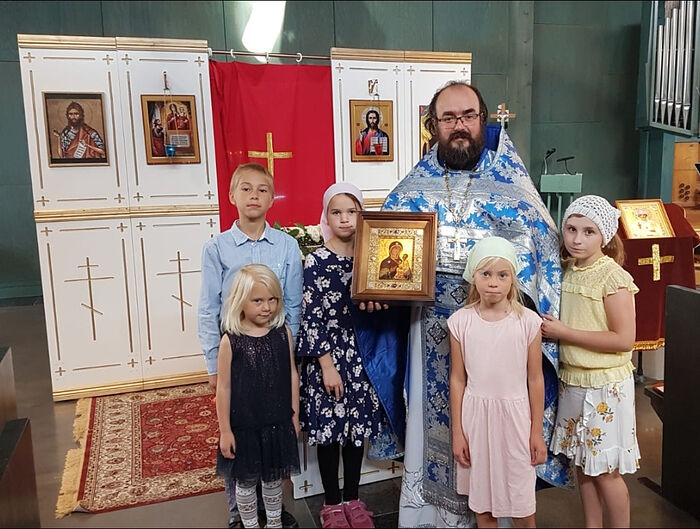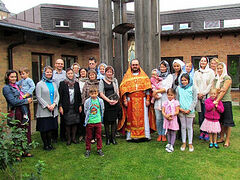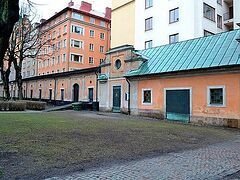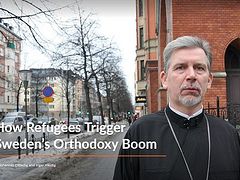—What were the most striking events in parish life during your ministry here?
—The most striking events are connected with our festivals—the feast of St. Sergius, for example. We’ve celebrated hierarchal services twice, gathering many worshipers, with guests from Moscow—a vast gathering of clergy, our friends and acquaintances. This attracted the attention of the Swedish public. The fifteenth and twentieth anniversaries will remain especially memorable for me, as they were connected with my ministry here. Those events resonated into the future, as we were able to extend our lease contracts with the Church of Sweden and find permanent premises.
— I like how you said “resonated into the future.” For Swedish society, this was not just a news report that some Russians had had a service. Obviously, for the first time many residents of the area had a chance to see a Russian Orthodox service and a cross procession with their own eyes. Did you have any new parishioners after those events?
—There were several isolated cases. I’d say, they came “unconsciously.” A person attended a service and for him it was a kind of museum experience. The “museum,” the sacred archaic, suddenly comes alive before their eyes. And this person begins to strive for this life intuitively and comes to church. There were cases when Swedes, impressed by Orthodox services, started seeking God in the Orthodox tradition.
—Please, tell us about them!
—For example, a Swede comes with his Russian wife, sits down on a pew, and starts listening to the prayers. For him, we begin to serve certain parts in Swedish. Then he feels that the grace of God has touched him, but he can’t formulate what is happening to him—he needs some hints. Pastoral responsibility extends in this sphere where you need to find some time for this person and talk to him. Next, the right chord of his soul is touched, encouraging him to think and urging him to pray, which he hasn’t done before. He slowly begins to integrate into the Body of the Church of Christ.
There were several such people in my practice. But there are no beautiful stories of miraculous conversions unless we consider it a miracle when people of a secular mindset who don’t care where to go suddenly stop at Orthodoxy, and in addition to their personal feelings, sincere spiritual thirst is born. They start seeking God.
They didn’t find this in the Church of Sweden, and such questions didn’t come up in their minds. And after coming to Orthodoxy through Russian acquaintances, visiting once just to see the baptism of a child, members of the Church of Sweden or even atheists suddenly see a priest, the sacraments, and hear words in an unfamiliar language. Something touches their souls and they want to stay with us. There are many such cases.
—That's amazing.
—There’s a moving example of the conversion of a Swede who since the time of his conversion has been doing everything for the glory of God. He has built a church on his plot of land, far in the north.
He reminds me of a simple village priest. He is a native Swede. From personal convictions, while studying the Scriptures and the Church Tradition, he discovered Orthodoxy. The Lord revealed himself to him in Russian Orthodox garments, as it were.
Imagine that somewhere in the far north a Swede abandons city life, goes into family seclusion while remaining a member of the Church of Sweden, starts working and preaching the Gospel. In spirit, he becomes Orthodox. He builds an Orthodox church on his land, and soon I hope we will begin services there. Who knows, God willing, he may eventually become a priest of the Russian Church in the north of Sweden.
A unique situation. Let’s say a long-haul truck driver is driving from somewhere in Romania across Europe. He comes to Sweden. And suddenly in the wilderness, by the road, he sees an Orthodox church built according to the northern Russian traditions. He puts on the brakes and can’t believe his eyes. A miracle! And this miracle is thanks to the activities of a Swede whose heart was touched by the Lord. He’s looking for ways to serve God and attract people to Orthodoxy.
—Wonderful! What is the name of this hero and where is the church built by him?
—His name is Mikael. His village or, more precisely, family farmstead, is about sixty miles north of the town of Luleå. It’s almost beyond the Arctic Circle, thirty miles from Jokkmokk, a Finnish-Swedish settlement.
—Can you tell us more about him?
 —Sure! He is a hard worker. He’s forty years old, has a family and children (three boys). He left the city and took up farming. This was partly due to his search for God. He still remains a minister of the Church of Sweden. But in spirit, he belongs to Orthodoxy. He spends the money he earns from his social work (reading the Holy Scriptures to pensioners) on the construction of an Orthodox church. In the Church of Sweden, every parish can organize its inner life as it sees fit. If you think that the liturgical part is a priority, you celebrate Mass. If you think that serving the poor and charity work is more relevant, then you don't have to serve at all and your whole community gets busy feeding the homeless. Mikael has such a parish: social ministry plus mission—preaching the Gospel. But in spirit he is genuinely Orthodox! It’s always a pleasure talking with him.
—Sure! He is a hard worker. He’s forty years old, has a family and children (three boys). He left the city and took up farming. This was partly due to his search for God. He still remains a minister of the Church of Sweden. But in spirit, he belongs to Orthodoxy. He spends the money he earns from his social work (reading the Holy Scriptures to pensioners) on the construction of an Orthodox church. In the Church of Sweden, every parish can organize its inner life as it sees fit. If you think that the liturgical part is a priority, you celebrate Mass. If you think that serving the poor and charity work is more relevant, then you don't have to serve at all and your whole community gets busy feeding the homeless. Mikael has such a parish: social ministry plus mission—preaching the Gospel. But in spirit he is genuinely Orthodox! It’s always a pleasure talking with him.
And it seems like there’s no need for what he has been doing. He is building a church “at the edge of the earth,” he orders icons and bells from Russia, he runs a small farm—and no one needs anything he’s doing. And most Orthodox Christians still don’t know about him. We are shouting about him at the top of our lungs, but the north of Sweden is still pretty remote. We need to shout louder and maybe here in Sweden they will hear us, and the echo will come from Russia.
We’re always complaining, “There is no money for a church!” But a Swede just built one himself! We should be ashamed. Of course, there are nuances: The land is his own private plot, etc. But he isn’t rich. He transforms his modest earnings into a real architectural masterpiece. In the future, we hope to celebrate services in this church, bring children’s camps there, set up tents and arrange a lecture hall on the territory.
—Talking about Mikael, we somehow left cozy Stockholm and went on an expedition to the Arctic Circle. Now let’s talk about other Orthodox communities in Sweden. How many parishes of the Russian Church are there in total? Please tell us briefly about them, especially those that you take care of. Are these communities in small towns or large cities?
—There are twelve parishes of the Moscow Patriarchate in Sweden. All of them are at a considerable distance from each other, between sixty and six hundred miles apart. Outside Stockholm, our parishes have between twenty and a hundred members each, but not more. There are seven parishes under my pastoral care. They are all in big cities. We rent premises for all services. Once every month or two, I travel to them to celebrate the Liturgy; we talk, solve issues in an informal atmosphere, and have Sunday school classes.
All our parishes are located in significant regional centers. Our parishioners live in the vicinity; they form religious communities and invite a priest. Sunday schools are opened in the parishes, and small cultural and religious centers are established. Sometimes this draws a response from Swedish society. They are looking for contacts with us, and sometimes joint cultural events take place.
The only parish that will soon have its own church building is in Västerås. Construction is underway there. Of the twelve parishes, only two have priests: in Stockholm and Västerås. The northern parishes are temporarily without priests. I travel there myself.
—Returning to the resonance in Swedish society that found out about the emergence of an Orthodox community in their city. What attracts them to your parishes?
—Swedes are attracted by the fact that a religious parish community has appeared, which is supporting its own members, compatriots, and as a rule, through cultural projects. Swedish government agencies are interested in a national or religious organization to support its members with projects, and they are ready to finance them. When we announce that we have a Sunday school and host meetings with stories about our national culture, religion, history and contacts with Sweden, the State supports this, even offering financial support for parishes, to motivate our teachers to continue their work.
 We have cross-cultural projects, like maintaining the graves of Russian soldiers in a Swedish cemetery. These cemeteries have been preserved for centuries through the care of Swedish people, despite the fact that it’s Russian soldiers who fought against Swedes who are buried there. And now some Russians are coming and reviving the memory of these burials by holding memorial services, commemorating both Swedes and Russians. Of course, such points of contact with Sweden resonate. The Swedish public understands this and supports our initiatives at the level of local communities and administrations. Unfortunately, this is the case until the moment when symbols of Russian statehood, such as our flag, appear. Today Sweden, like other countries of the Old and New Worlds, engage in all sorts of serious speculation on political topics regarding Russia. So we are forced to be rather isolated. We’d like to participate in events with the Russian Embassy, but our modern reality limits the opportunity to fly the Russian flag wherever we indicate our presence. Though it is perfectly fine for other ethnic groups to do so: Georgians, Greeks, Serbs, Ukrainians. When it comes to Russians, the reaction is immediately, “It’s the Kremlin, on our land!” To be honest, the Swedes themselves are probably pretty tired of this politicized attitude. This is probably the saddest and least free part of our ecclesiastical and cultural initiatives in Sweden: There is a feeling of public “unwelcomeness” of Russian national symbols.
We have cross-cultural projects, like maintaining the graves of Russian soldiers in a Swedish cemetery. These cemeteries have been preserved for centuries through the care of Swedish people, despite the fact that it’s Russian soldiers who fought against Swedes who are buried there. And now some Russians are coming and reviving the memory of these burials by holding memorial services, commemorating both Swedes and Russians. Of course, such points of contact with Sweden resonate. The Swedish public understands this and supports our initiatives at the level of local communities and administrations. Unfortunately, this is the case until the moment when symbols of Russian statehood, such as our flag, appear. Today Sweden, like other countries of the Old and New Worlds, engage in all sorts of serious speculation on political topics regarding Russia. So we are forced to be rather isolated. We’d like to participate in events with the Russian Embassy, but our modern reality limits the opportunity to fly the Russian flag wherever we indicate our presence. Though it is perfectly fine for other ethnic groups to do so: Georgians, Greeks, Serbs, Ukrainians. When it comes to Russians, the reaction is immediately, “It’s the Kremlin, on our land!” To be honest, the Swedes themselves are probably pretty tired of this politicized attitude. This is probably the saddest and least free part of our ecclesiastical and cultural initiatives in Sweden: There is a feeling of public “unwelcomeness” of Russian national symbols.
—But the Swedes don’t perceive Russian parishes as branches of the Kremlin on their soil. Judging by your words, it looks like this: communities hold events, open Sunday schools, and the local administration itself comes and offers help.
—It usually looks like that. When we register a religious organization, the administration asks a reasonable question: “What specifically are you doing?” We explain that between ten and twenty Russian-speaking pensioners gather, and we are engaged in social work with them, satisfying their religious needs. There are situations when we organize a school. There are many families with children who want to preserve their ethnic, religious and linguistic traditions. We hold regular meetings and invite teachers, including from Russia, to support and preserve our cultural identity. When Swedes hear this, they think it is good and remarkable.
Since such communities are absolutely legal, we can expect some benefits. Although they are small in comparison with Norway, they express the attitude of the authorities towards us. There are no obstacles to our spiritual and religious life.
—Are there conflicts in terms of worldview with the State and society? While supporting the Orthodox Church, the State also supports absolutely anti-Christian movements, sometimes even promoting their ideologies, as you yourself have mentioned.
—There are no conflicts. We have common ground where our interests intersect. We meet within the framework of our cultural and social projects. For example, we share with Swedes our views on how to lead one’s personal life, show them the beauty of Orthodox icons and theology. We can arrange an exhibition, a conference, a concert of Old Russian Church chants. And Swedes come. Each of them remains a member of the Church of Sweden, where the präst (pastor) will urge them to “worship not the Holy Trinity, but the One God, because the idea of the Triune God contradicts biblical teaching. This is an invention of the Church Fathers of recent times, who could err.” And such people can easily come to us to listen to a lecture on Orthodox icons.
There are no conflicts between the Russian Church and Swedish Protestants. We live within the same cultural and legal space. Individual people make their own choices. We just give them an occasion to think seriously about things. The current trends in Swedish society do affect us, but we remind them that there are also other priorities and other realities. And people make independent choices based on their upbringing and preparedness. Some come to church for advice through their Russian friends.
—You mean that in Sweden, people outside the Church view the Russian Church as a kind of spiritual authority?
—Yes, and they view the Church as an authority, not the priest. Since the Swedes are brought up in a collegial spirit, they wonder, “What do these people think and how do they live?” If decisions are made by the priest alone, they are suspicious. When decisions are made by a congregation of parishioners who want to be part of an ancient tradition, this is attractive. They see that everything is legally sound, that there’s no guru bewitching everyone. But the life of a congregation, through which God can act, as He did in the Bible, is important for the Swedes who haven’t lost their religious orientation. So sometimes they come, via their Russian friends or relatives, and ask for advice on how to act in a given situation; they wonder what the Orthodox Church has to say, what you can say as a priest...
—Now that we’ve touched upon relations with the State, we can transition to the tough topic of the life of the Church in the time of this pandemic. What effect have the pandemic-related restrictions had on your parish life? How did you find your way in this situation? What difficulties have you faced?
—Sweden chose its own path to deal with the pandemic. I can’t say if it is correct or not. This didn’t particularly affect the life of our parishes. We only comply with the requirements of the authorities, such as observing social distancing between people attending services and using hand sanitizers. We have faced significant restrictions on the number of parishioners since autumn. This past December, the authorities introduced restrictions on attending public events—no more than eight people. This also applied to religious organizations. Given that we usually have a hundred communicants at any given Sunday service, reducing their number to eight is a serious challenge. But we were ready for this because the rest of Scandinavia and other countries had already been living like this. We made use of their experience, consulted with priests from other parishes in Europe. When restrictions were introduced in December, we began to draw up lists of parishioners and a timetable for their participation in services, and started to celebrate services on weekdays as well.
The only restrictions for major services, weddings, and baptisms are the number of attendees. Everything that we have a spiritual need for is unimpeded. You can pray in the church or invite a priest to your house.
—What is the main lesson you have learned over the years of your priestly ministry, especially in Sweden?
—This lesson chiefly concerns my inner disposition: that I should be more patient, tolerant, restrained, attentive to people. I have plenty of work to do on myself. The people whom the Lord has brought me together with, people of the diaspora, are a rather specific flock. I have to develop a special style and culture of communication with them. What was good and acceptable in a parish near Moscow needs to be adjusted here. I don’t mean indulging their human weaknesses—I mean spiritual work. If earlier it was possible to ignore something (“it will pass on its own”), here a disease can worsen; so I have to pay close attention to people. In the Moscow region, someone could hear your words and instantly become a different person. The situation here is different. The main lesson for me is constant work and honing my personal qualities.
—May Christ bless you for this wonderful conversation. To wrap things up, I’ll ask our traditional question: What words from the Holy Scriptures especially inspire you and have supported you in difficult moments of life?
—What comes to mind right away is: Come unto Me, all ye that labour and are heavy laden, and I will give you rest. Take My yoke upon you, and learn of Me; for I am meek and lowly in heart: and ye shall find rest unto your souls (Mt. 11:28-29).
This is what makes our life here relaxed, proper and festive. I hope the same words, through us, will have an effect on Sweden to one degree or another, when people meet us and our parishioners. The yoke of Christ is a good burden. Life is easy with Christ, always and everywhere.







